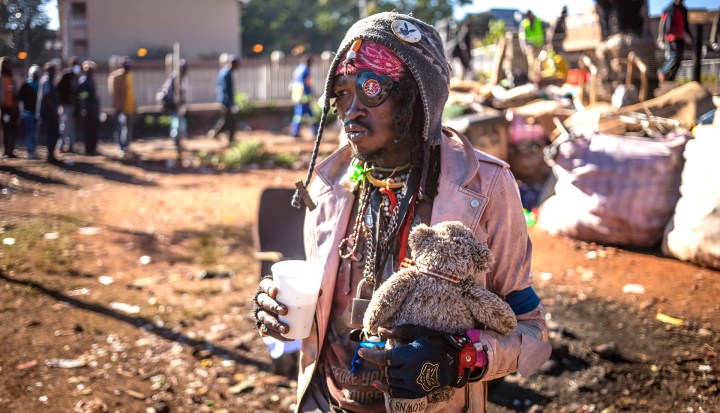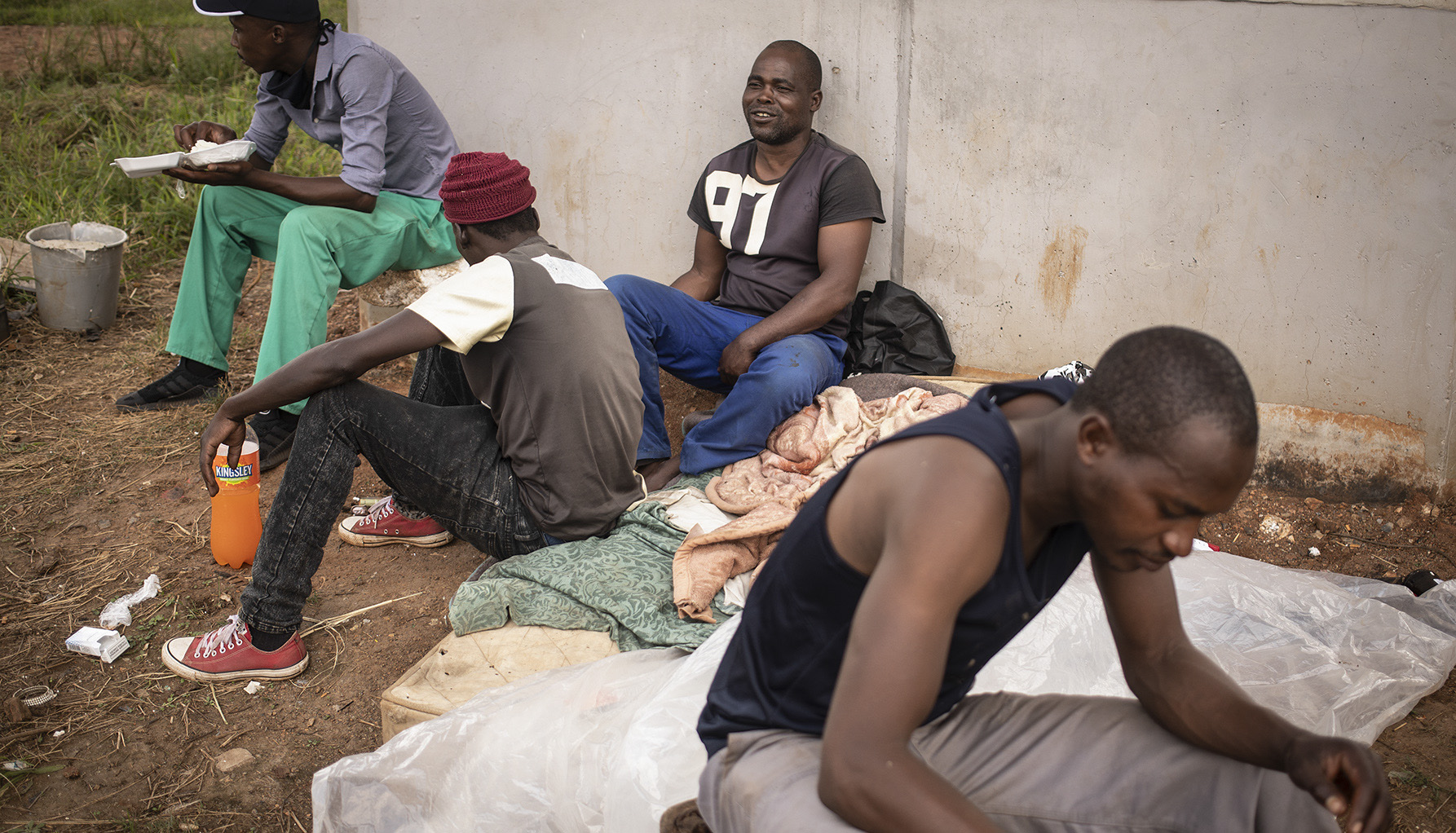MAVERICK CITIZEN OP-ED
Down but not out: Why so many homeless people in Joburg reject municipal shelters

If you work piece jobs, hustling the streets to survive, you have to be an early bird. People in authority often say the homeless, those who sleep rough on the street or in parks, should go and stay in shelters. But it is not so simple and many homeless people reject shelters.
Tshabalira Lebakeng is a writer with the Homeless Writers Project. This story was written by Lebakeng with assistance from Harriet Perlman.
I lived on the streets for five years. I was only 12 years old when my mother’s boyfriend kicked me out and I found myself looking for somewhere to sleep on the streets of Durban. I slept on a piece of cardboard in a large cement pipe on the side of the road. I met other barefoot friends, young boys like me who were alone on the streets.
They were surprised to see me sitting at the train station. They thought it was a joke.
“We always see you with your mother, why are you here?” they asked.
My mom kicked me out and I need a place to stay. So I stayed with them. They helped me find a blanket. The first night was a long night. I only had one blanket. I was used to four and a pillow. When I opened my eyes I saw the stars and the big sky looked so scary. I thought I was dreaming.
I came to learn that sleep is not for homeless people. There is a saying: “Walala wasala.” You sleep, you are left out. You snooze, you lose.
We are all early birds. There is no time to sleep.
Every morning we woke up early to hustle. There are many people who take early trains or buses to work. So we woke up and stood at the train station as early as three or four in the morning. So, sleeping in a shelter didn’t help us. They only open at six. By 6am other street kids have already got their food for the day. If you are too late they call you “kubamba ezingelayo”, “sleeping dogs who can’t hunt”.
I stood on the corner and did little performances. Imitations of people on TV. Other boys helped people find their platform or helped carry their luggage. If you helped, you could make enough to buy supper: “Mama, you going to Umlazi? I can show you where. You can give me anything. Bread, some money. I am your boy.”
Me and my team would tell people we are not crooks. We are just trying to survive.
The afternoons were another time to find food. People coming back from work had leftovers in their lunchboxes. If we all made just R15 it was enough to buy supper. We would go to a fish and chip shop in town.
We also knew restaurants where people were throwing out food not eaten that evening. They knew us. If we were lucky, we ate spaghetti, meatballs and cheese for supper. We felt like movie stars.
So the day was busy. There was no time to run and find space at the shelter. At the shelter you also had to pay R150 a night. There were shelters that were free but the thugs were there and it smelt like a fungus. And every cent counted. It was food.

Brian Tofa (right) and his homeless friends sit under a railway bridge where they live as they eat some lunch given to them by the Hennops Revival NPO in Gauteng, South Africa. (Photo: EPA-EFE / KIM LUDBROOK)
That was the 1980s in KwaZulu-Natal.
Now I live in a shack in Soweto but I wanted to find out what homeless people feel about shelters, so I went to Johannesburg.
I met Siza (not his real name). He’s 30 years old, comes from KZN and wears an old orange jacket with “Security” written on the front. He sits on his trolley. He waits at Park Station and when he sees travellers with too much luggage to carry he offers to help them.
“Mama, do you need my Code 14? I can load anything for you.” That’s how he earns some money.
He is drinking his coffee when I meet him. It’s very cold in Jozi this morning. I ask him what time he left the shelter. He looks at me like I’m crazy. He says he is not a friend of shelters and doesn’t stay there. When you go to sleep in a shelter someone might snatch your bags. You will wake up having nothing. No phone, no money. It’s like being in prison.
“Also, this is a busy town,” he says. “At the shelter they tell me to leave my trolley outside. But I can’t do that because if they steal my Code 14, I won’t find another one and this is my bread and butter. I need to always be next to my truck.
“I like my own space and my freedom,” he says. “Out here I help people day and night and I have my own corner where I sleep any time when I want.”
What about washing? I ask.
Near Hillbrow there are showers; you pay a little to use them. But the problem is, when you are in the shower, thugs come and steal your clothes, leaving you naked. You have to try to shower one side at a time, while you hold your pants, so no-one runs away with them.
“No one will help you if you shout: ‘Help me, he has my pants,” notes Siza. I laugh.
I want to ask him more, but Siza doesn’t want to talk further. There are customers about and he needs to work. I thank him and he replies: “Hey, you can’t have this conversation for nothing. Buy me one draw.” I buy him two. “You are a good man.”
I make my way to the Diplomat’s Night Club. I want to find Dladla. That guy, he can marinade, and I often buy food from him. Dladla is a good looking young man. He is clean and smells good. He is friendly and everyone around here knows him.
He is sitting at the Diplomat’s entrance. They call him “Braai Master” because he’s got a small braai stand on which he braais chicken gizzards on long sticks. Whenever I’m in town I buy his food. I ask Dladla where he sleeps at night.
“Nkabiyami shesha ziyabuya lana,” he says. (“My friend, it’s happening here, you need to be fast”).
Dladla sleeps in a broken building in town. He pays R20 a night to the owner. I asked him about shelters. He says sleeping in a hijacked building is safer than the shelter. People there know each other and no-one will run away with his braai stand, bag of charcoal, spices and container in which he marinates his chicken gizzards.
In shelters there are too many strangers: “They want to take my things.”
He was once arrested because he fought with someone trying to rob him at a shelter. Also, shelters open and close at specific times and he needs to be up early to run his business.
“You can see, my brother, my business is to make people happy with food. So, Walala Wasala. You sleep, you get nothing.”
I leave Dladla and am about to cross the street to the MTN taxi rank when I bump into long-lost friend Tsakani from Orlando. He is washing a taxi in the freezing cold.
I know him from Soweto. We used to go to a small theatre group together. Tsakani liked us, but was not interested in acting. He wanted to be in business but there were no opportunities. He dropped out of school and joined the theatre group just to keep off the street. He said I would be a movie star, South Africa’s Rambo. But he wanted to have two big shops, one in town and one in Soweto. “I want to be the next Maponya,” he said back then.
I greet him. He is surprised to see me after such a long time. He asks about my acting career in movies. I tell him life it’s still difficult on my side. But, for now, I’m writing for Maverick Citizen.
He tells me he works at the taxi rank every day, washing taxis. He has more than 10 clients – taxi drivers who trust him. “They know they can leave money or belongings, their keys or cell phone in the taxi while I wash for them.”
I ask him where he sleeps every night. He says sometimes he sleeps in someone’s taxi. If you work in the taxi industry you have to wake up very early. Early birds! If he stays in Soweto he’ll be too late. He needs to be ready with bucket and cloth to wash taxis at 2am.
“You need to be fast to get first in line to wash taxis before they leave for Randburg at 3.30am to fetch people who start work at 5 or 6 in the morning.”
Other times he goes to a broken building and pays a little money to stay for the night. He dips into cash reserves only as long as he can still send money back home.
I ask him about shelters. He says I should know you get nothing for free in South Africa. Some shelters are good but at others, if you want a bed, the security wants R100 cooldrink money. “That money, it’s too much. I can’t give a cooldrink while my mother she’s hungry at home. Ngizolala njengonogwaja kuyoze kulunge.
“So I will rather sleep like a rabbit, ready to jump up at any time. But one day it will be okay my friend,” he says.
It’s tough to leave my friend in town when it’s so cold. I’m going home to my backroom and a bed to sleep in. Tonight he is sleeping in the back of a taxi or in a broken building. DM/MC


















 Become an Insider
Become an Insider
I enjoy the Homeless Writers Project articles very much and find them very informative. They are very useful in helping me see the other sides of the stories. Keep it up
Thank you for sharing these experiences. I always wonder how homeless people survive…. Your courage, independence and enterprise are admirable.
These guys really need some guidance to move upward in the world. They’re keeping themselves stuck in a poverty mindset cycle while thinking they’re achieving something by hustling ‘the grind’. Eating from a fish and chips shop is throwing money away. That’s hardly nutritious and wise use of money. Better use of money and savings would help them get a foot up.
Brandon, you are a sad and ignorant human. Along with the likes of Zuma, people like you hold our country back. You clearly live in a very deep hole man.
It is easy to give advice from our own perspectives…advice is always in abundance, but people are less inclined to listen to the realities faced by others. There are many wrongs with our society today, some historical and some more recent.
I thank the writers of this article for humanising the realities faced by some of our citizens. Conscious choices are made by individuals because the alternatives available are worse than what we thought the obvious choice to be.
Thanks for this.
I know crime is rampant in the streets of Jozi but can your next piece explore how cellphone penetration is in the streets? I’ve noticed that the homeless around Auckland park have Cellphones
Where do they charge them? How do they keep them safe? Are they keeping in touch with those at home?
That would be rather interesting.
What amazing people. I bow in humility.